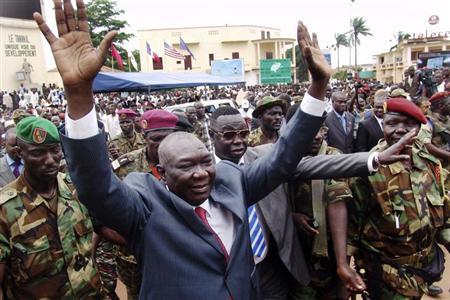Leaders of the Central Africa regional bloc recognized Michel Djotodia on Thursday as transitional head of the Central African Republic but stopped short of embracing him as president, conveying their concern about his taking of power by force.

African heads of state and Western powers had refused to recognize him as the country’s legitimate leader and called for the creation of a transitional council to lead the nation to elections within 18 months.
After a meeting in the Chadian capital N’Djamena on Thursday, Central African heads of state said they had taken note of Djotodia’s election last weekend by the transitional council in Bangui acting as a parliament.
“Mr Djotodia will not be called president of the republic, but head of state of the transition,” Chadian President Idriss Deby said after the meeting, which included a delegation representing the transition government.
The regional leaders, who have been mediating in Central African Republic’s crisis to overcome feuding among its various factions, also adopted a framework for Bangui’s transitional rule, increasing the number of council members to 130 from 105.
Under the roadmap, Djotodia will lead the transition but not be eligible to run for the presidency at the end of it.
Djotodia has said improving security in the ramshackle capital and across the impoverished, landlocked nation would be his main priority during the transition period.
Seleka launched its insurgency in early December, accusing Bozize of reneging on a 2007 peace deal by failing to make promised payments to rebels who had help him seize power in 2003 and to integrate them into the regular army.
Calm has yet to return in Bangui since last month’s coup as Seleka fighters have repeatedly clashed with youths loyal to the ousted former president. At least 13 people were killed and dozens wounded in violence on Tuesday.
A mix of local rebellions, banditry, ethnic tensions and spillover of conflicts from neighboring Chad, Sudan and Democratic Republic of Congo have long undermined efforts to stabilize Central African Republic, which has suffered from misrule and lawlessness since independence from France in 1960.

